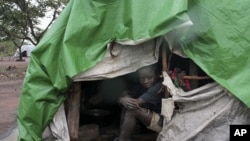A new survey of displaced civilians in northern Central African Republic (CAR) finds people suffering acute hardship are forced to take extreme measures to survive. The survey, conducted by the United Nations refugee agency and the Danish Refugee Council, finds a high incidence of teenage marriage and widespread use of children as labor.
This survey covers 300 families from a population of 17,000 people who previously had been isolated because of war. The displaced live near the town of Ndele in northern Central African Republic. The town has been off limits to aid agencies for a long time because of the fighting.
U.N. refugee spokesman Andrej Mahecic says displaced people in the area had almost no access to humanitarian help before June. He says it became possible to gain access to the region when a cease-fire was signed between rebels of the Patriots’ Convention for Justice and Peace and the CAR government.
He says before the peace agreement, the only civilians able to benefit from humanitarian assistance were those who managed to reach Ndele.
“There was an opportunity after the cease-fire," said Mahecic. "So, we decided first to do a survey in order to get a better picture of the humanitarian situation in this area and what are the needs of the displaced people.”
And, as the survey reveals, the needs are great. The survey shows one in five of the 300 families had lost at least one family member during the first half of this year because of insecurity, a lack of health services or a shortage of food.
Mahecic says nearly one-third of the children between the ages of six and 15 were being used as child labor.
“Among girls between the ages of 12 and 17, 30 percent had been sold into marriage," said Mahecic. "IDPs [Internally Displaced People] told UNHCR that they married their underage daughters to members of the host communities or sent children to farm and fish for these communities in exchange for housing, food or money. UNHCR staff also received reports of gang rape by the armed groups, which arrive in the area.”
The survey was carried out mainly between May and September. The UNHCR says more villages in the region will be surveyed to assess their conditions and needs.
The northern town of Ndele is around 700 kilometers from the CAR capital, Bangui. It once was considered the country’s breadbasket. But since 2005, few residents have been able to farm.
Many have been reduced to living in the bush in fear of the rebel groups and armed bandits operating in the area.











